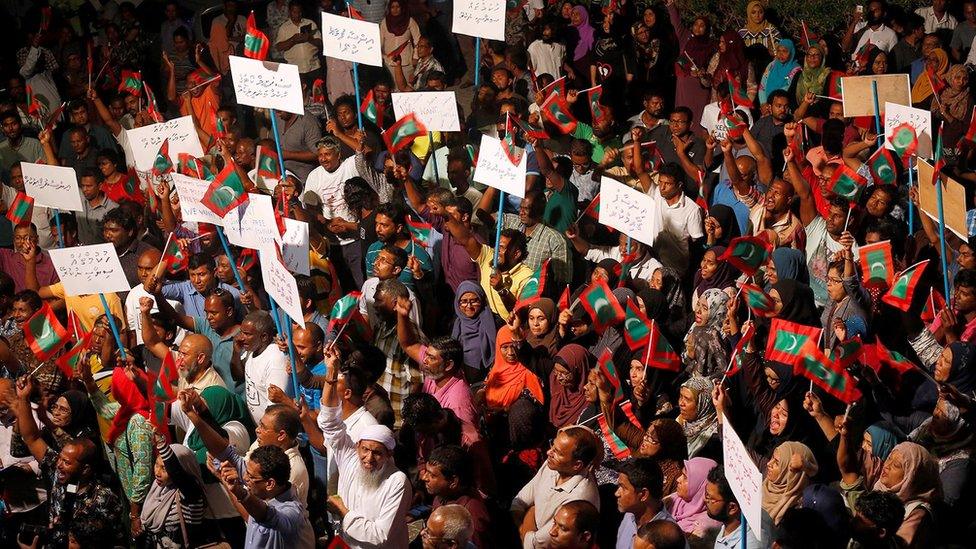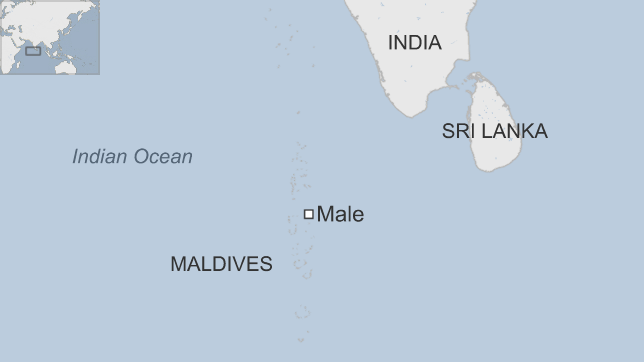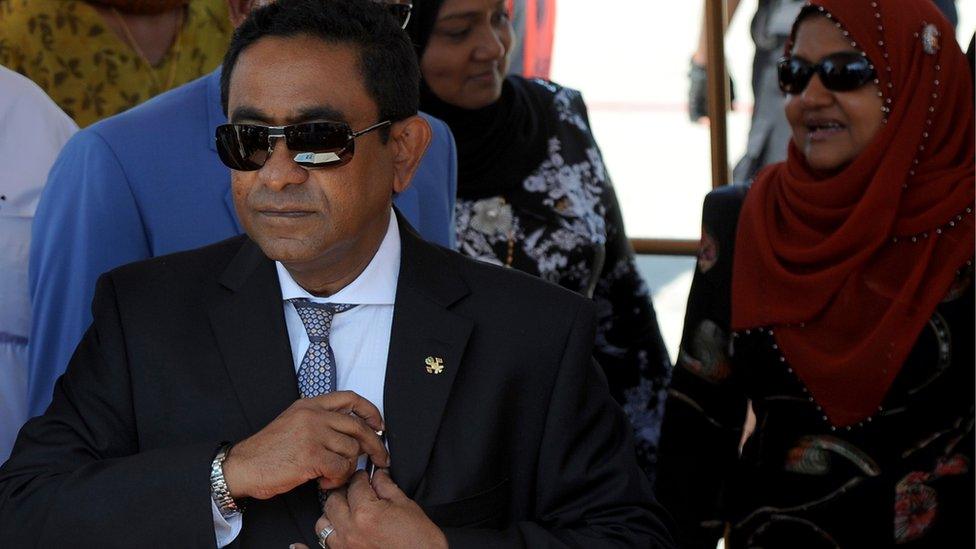Maldives: Supreme Court judges arrested amid political crisis
- Published
Trouble in paradise: Maldives crisis explained
Maldives police have arrested the country's chief justice of the Supreme Court as a political crisis worsens in the Indian Ocean nation.
Chief Justice Abdulla Saeed and another judge, Ali Hameed, were arrested hours after the government declared a state of emergency.
No details were given about the investigation or any charges.
The turmoil began when President Abdulla Yameen refused to obey a court order to release political dissidents.
The opposition have called the government moves a "purge" and there has been international condemnation.
Maldives is a nation made up of 26 coral atolls and 1,192 individual islands, and tourism is a vital part of its economy.
What's happening in the Maldives?
Last week, the Supreme Court ordered the release of a group of opposition politicians. It also ruled that the 2015 trial of former President Mohamed Nasheed, who is living in exile, had been unconstitutional.
The country's police commissioner said he would enforce the court's ruling - in response, the government of President Yameen sacked him.
The army has now been ordered to resist any attempt to impeach or remove President Yameen.
The crisis escalated on Monday when a state of emergency was declared, giving a range of powers to the security forces to make arrests, and banning public gatherings.
Mr Nasheed called on India and the US to help remove President Yameen, who had "illegally" declared martial law, he said.
In a tweet, Mr Nasheed asked for India to send an envoy to help release the political prisoners, and the US to impose financial sanctions on the Maldives' leaders.
Former President Maumoon Abdul Gayoom, who has allied himself with the opposition, was detained at his home.
In a video posted online the ex-president addresses his supporters (in Divehi), external, saying that he has not "done anything to warrant arrest" and urging them to "remain strong".
Police were also dispatched to the Supreme Court.
What has the reaction been?
Mr Nasheed - the country's first democratically elected leader whose trial was at the centre of the Supreme Court's ruling - told BBC News that the government's actions were "brazenly illegal" and amounted to a coup.
"Maldivians have had enough of this criminal and illegal regime," he said. "President Yameen should resign immediately."

On Sunday, opposition supporters demanded the release of nine jailed MPs
Since President Yameen took power in 2013 the country has faced questions over freedom of speech, the detention of opponents and the independence of the judiciary.
The US State Department said it was "troubled and disappointed" by the developments.
Allow X content?
This article contains content provided by X. We ask for your permission before anything is loaded, as they may be using cookies and other technologies. You may want to read X’s cookie policy, external and privacy policy, external before accepting. To view this content choose ‘accept and continue’.
It accused police of failing to obey a lawful court ruling, and said President Yameen had "jailed or exiled every major opposition political figure".
The US National Security Council, meanwhile, warned in a tweet that "the world is watching".
Boris Johnson, foreign secretary of the UK, the former colonial power, called on President Yameen to lift the state of emergency.
"The damage being done to democratic institutions in Maldives and the sustained misuse of process in Parliament is deeply worrying," he said in a statement.

Maldives media face closure and cyber-attacks
by BBC Monitoring
Media outlets in the Maldives have been affected as the country remains in a state of emergency.
Concerns over media freedom arose last week when the Maldives Broadcasting Commission warned that private TV stations would be shut down if their coverage was deemed to pose a "threat" to "national security".
On the day the emergency was declared, the Maldives Independent news website tweeted: "Our website is under attack and currently inaccessible. Timing of attack coincided with State of Emergency declaration in #Maldives. We are currently unable to report on our website."
As of 6 February the website appears to be unavailable. The outlet said on Twitter that its website is "still under attack" but added that they would "continue live tweeting".
RaajjeTV, an opposition-aligned station also indicated that a shutdown was "imminent", adding that they would "continue to work for the people of the Maldives till the last minute. We have no security."
The Committee to Protect Journalists has said that "authorities in the Maldives must immediately stop trying to exert control over the media and access to information" and "abide by its constitutional commitment to the freedom of speech".

What does this mean for tourists?
The political crisis comes during the country's peak tourism season when tens of thousands of foreigners visit the Maldives' tropical beaches.
China, the United States, India and the UK are among those issuing warnings to travellers in the Maldives.
The UK's Foreign and Commonwealth Office said British nationals in the capital, Malé, should "exercise caution and avoid any protests or rallies", but that outlying islands and resorts - and the international airport - were not affected.
Tourism was worth $2.7bn (£1.9bn) to the Maldivian economy in 2016. It is the biggest industry in the country - home to just 400,000 people - and could be hit hard if the crisis worsens and puts people off travelling.

- Published13 October 2016

- Published10 August 2017